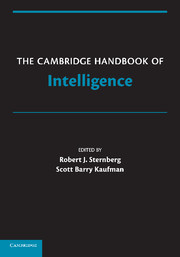Book contents
- The Cambridge Handbook of Intelligence
- The Cambridge Handbook of Intelligence
- Copyright page
- Dedication
- Contents
- Contributors
- Preface
- Part I Intelligence and Its Measurement
- Part II Development of Intelligence
- Part III Intelligence and Group Differences
- Part IV Biology of Intelligence
- Part V Intelligence and Information Processing
- Part VI Kinds of Intelligence
- Part VII Intelligence and Society
- Chapter 31 Intelligence in Worldwide Perspective
- Chapter 32 Secular Changes in Intelligence
- Chapter 33 Society and Intelligence
- Chapter 34 Intelligence as a Predictor of Health, Illness, and Death
- Part VIII Intelligence in Relation to Allied Constructs
- Part IX Moving Forward
- Author Index
- Subject Index
Chapter 34 - Intelligence as a Predictor of Health, Illness, and Death
from Part VII - Intelligence and Society
Published online by Cambridge University Press: 05 June 2012
- The Cambridge Handbook of Intelligence
- The Cambridge Handbook of Intelligence
- Copyright page
- Dedication
- Contents
- Contributors
- Preface
- Part I Intelligence and Its Measurement
- Part II Development of Intelligence
- Part III Intelligence and Group Differences
- Part IV Biology of Intelligence
- Part V Intelligence and Information Processing
- Part VI Kinds of Intelligence
- Part VII Intelligence and Society
- Chapter 31 Intelligence in Worldwide Perspective
- Chapter 32 Secular Changes in Intelligence
- Chapter 33 Society and Intelligence
- Chapter 34 Intelligence as a Predictor of Health, Illness, and Death
- Part VIII Intelligence in Relation to Allied Constructs
- Part IX Moving Forward
- Author Index
- Subject Index
Summary
Keywords
Information
- Type
- Chapter
- Information
- The Cambridge Handbook of Intelligence , pp. 683 - 708Publisher: Cambridge University PressPrint publication year: 2011
Accessibility standard: Unknown
Why this information is here
This section outlines the accessibility features of this content - including support for screen readers, full keyboard navigation and high-contrast display options. This may not be relevant for you.Accessibility Information
- 2
- Cited by
